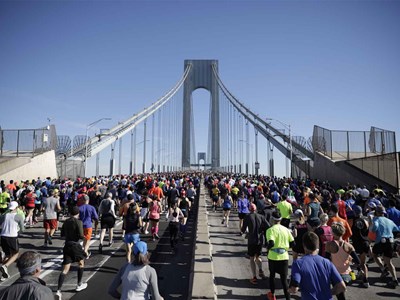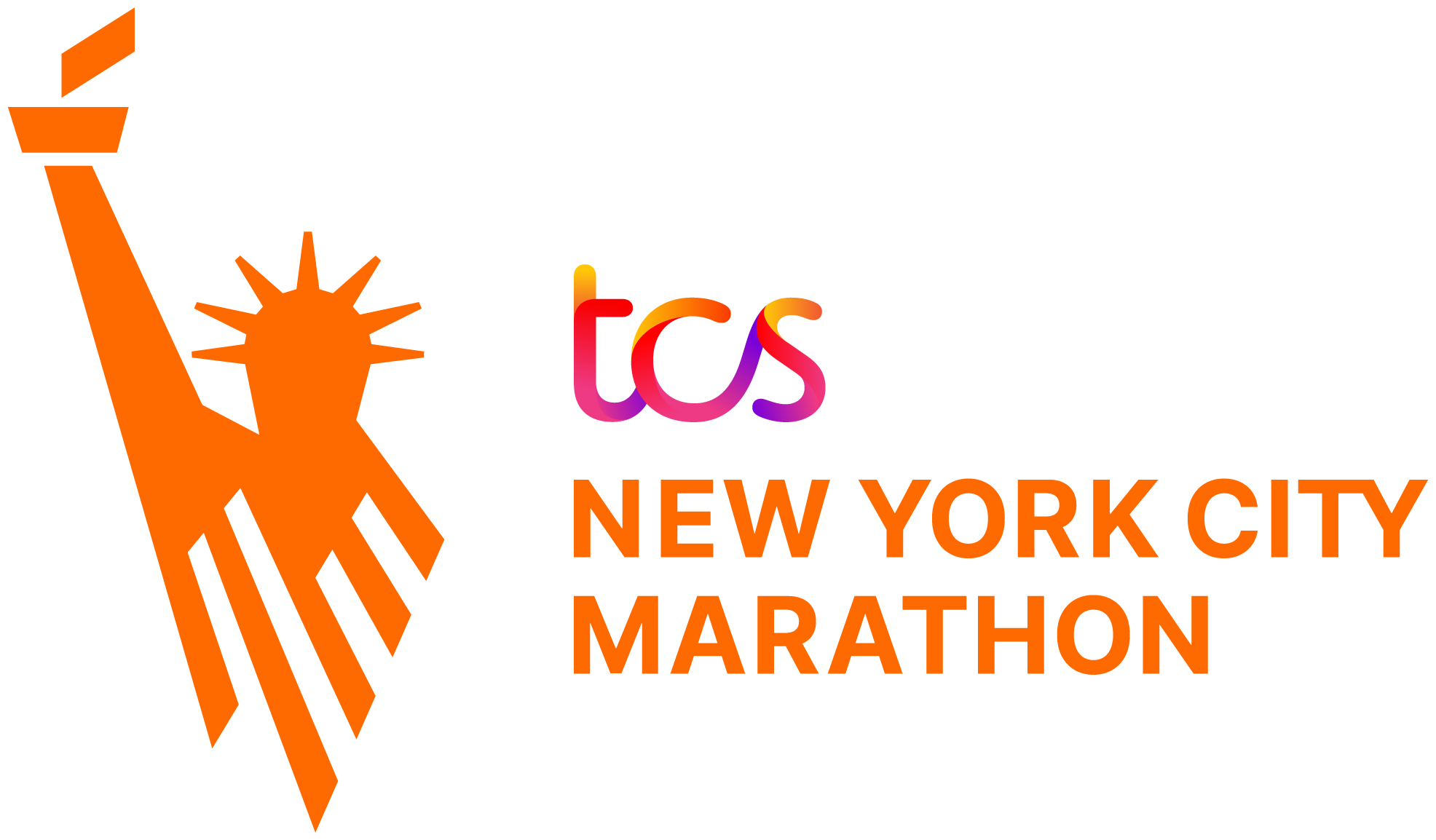New York City Marathon History

Over the past 50 years, the New York City Marathon has grown from a local road race held entirely in Central Park to the world’s largest marathon.
1970s
- The first New York City Marathon, organized by New York Road Runners, takes place September 13, 1970, in Central Park, with an entry fee of $1 and a budget of $1,000. Of the 127 registered runners, there are 55 finishers.
- The 1975 New York City Marathon gains attention as the U.S. women’s championship. With 339 finishers, the race is seen to be outgrowing Central Park.
- To celebrate the United States bicentennial, the 1976 New York City Marathon takes place through the five boroughs of NYC, with 2,090 entrants and 1,549 finishers. The race garners international headlines, with winners Bill Rodgers and Miki Gorman shattering the event records. Rodgers will win four consecutive times (1976–79).
- Running her first marathon, Norwegian Olympic track star Grete Waitz sets a world record of 2:32:30 at the 1978 New York City Marathon. She smashes her own record the following year with a 2:27:33, the first sub-2:30 women’s marathon.
1980s
- NCAA cross country champion Alberto Salazar wins the 1980 New York City Marathon in 2:09:41, at the time the fastest debut by an American. He wins again in 1981 and 1982.
- ABC-TV airs the New York City Marathon for the first time in 1981; its national broadcasts will continue through 1993.
- The New York City Marathon field nearly doubles during the decade, from 12,512 finishers in 1980 to 24,659 finishers in 1989.
- Grete Waitz wins her ninth New York City Marathon title in 1988. She’ll retire at age 37 after finishing fourth in 1990.
1990s
- The 1992 New York City Marathon produces the most poignant moment in event history when Fred Lebow, in remission from brain cancer, runs the race in 5:32:34 with Grete Waitz by his side every step of the way.
- Lebow passes away a month before the 1994 New York City Marathon and Allan Steinfeld succeeds him as race director.
- The 1994 race is won by Germán Silva of Mexico, who takes a wrong turn half a mile from the finish line, then recovers to pass compatriot Benjamín Paredes and triumph by two seconds.
- Tegla Loroupe of Kenya wins the New York City Marathon in 1994 and 1995, becoming the first African woman to win a major marathon.
- At the 1997 New York City Marathon, the finisher field surpasses 30,000 for the first time (30,427).
2000s
- The 2000 New York City Marathon includes the event’s first-ever wheelchair division; prize money is added in 2001.
- The 2001 New York City Marathon takes place less than two months after the September 11 attacks, symbolizing hope and recovery for a devastated city and nation.
- NYRR Team for Kids is launched at the 2002 New York City Marathon as a group of adult runners raising funds for NYRR youth and community programs.
- Global financial services company ING becomes the first title sponsor of the New York City Marathon in 2003. Kenya’s Margaret Okayo sets a still-standing course record of 2:22:31.
- Marathon world record-holder Paula Radcliffe of Great Britain wins the 2004 New York City Marathon; she’ll win two additional titles (2007 and 2008).
- Mary Wittenberg succeeds Allan Steinfeld as the New York City Marathon race director in 2005, becoming the first woman to direct a major marathon.
- In 2006, the New York City Marathon joins the Boston, Chicago, London, and Berlin marathons to form the World Marathon Majors. Tokyo is added in 2013 and Abbott becomes the series title sponsor in 2014.
- Kurt Fearnley of Australia sets a still-standing wheelchair division record of 1:29:22 at the 2006 New York City Marathon.
- NYRR hosts the 2008 U.S. Olympic men’s marathon trials in Central Park the day before the 2007 New York City Marathon.
- The 2009 New York City Marathon has 43,660 finishers, the most ever in any marathon. American Meb Keflezighi wins the men’s open division, becoming the first American champion since 1982.
2010s
- The 2011 New York City Marathon sees Geoffrey Mutai of Kenya set a still-standing event record of 2:05:06.
- The 2012 New York City Marathon is cancelled in the aftermath of Hurricane Sandy. Thousands of runners take part in relief and recovery efforts around the city and NYRR contributes funds, equipment and supplies in support.
- The 2013 New York City Marathon has 50,000+ finishers for the first time in history.
- NYRR signs a multiyear deal with ABC-TV and ESPN for coverage of the New York City Marathon.
- In 2014, Tata Consultancy Services (TCS) becomes the New York City Marathon’s title sponsor and the year-round premier partner of NYRR.
- The one-millionth New York City Marathon finisher crosses the line in 2014.
- In 2015, Peter Ciaccia succeeds Mary Wittenberg as the TCS New York City Marathon’s race director.
- On race morning in 2015, the first TCS New York City Marathon Youth Invitational sees hundreds of kids run the final stretch of the course and cross the finish line ahead of the marathon finishers.
- Tatyana McFadden of the United States sets a still-standing women’s wheelchair division record of 1:43:04 at the 2015 New York City Marathon. She is currently a five-time champion (2010, 2013–16).
- The 2016 TCS New York City Marathon is led by five NYRR Youth Ambassadors from NYRR youth programs.
- At the 2017 TCS New York City Marathon, Shalane Flanagan becomes the first American women’s open division champion in 40 years.
- There are 52,813 finishers at the 2018 TCS New York City Marathon, the most in any marathon in history. Daniel Romanchuk of the United States is the first American man to win the wheelchair race and, at age 20, the youngest champion in the division’s history.
- Kenya’s Mary Keitany wins the 2018 race’s women’s open division, giving her the second-most victories (2014–16, 2018) behind only Grete Waitz’s nine.
- Peter Ciaccia retires after the 2018 TCS New York City Marathon as race director and is succeeded by Jim Heim.
- Geoffrey Kamworor, Joyciline Jepkosgei, Daniel Romanchuk, and Manuela Schar are the champions of the 2019 TCS New York City Marathon, which has over 53,600 finishers, making it again the largest marathon in history.
2020s
- In response to the COVID-19 pandemic, the 2020 TCS New York City Marathon becomes a virtual event, taking place from October 17 through November 1 and drawing nearly 16,000 finishers from 108 countries around the world.
- In 2021 the 50th running of the TCS New York City Marathon takes place through the five boroughs with health and safety protocols for runners, staff, and volunteers. Over 25,000 finishers are led by wheelchair champions Marcel Hug and Madison de Rozario and open champions Albert Korir and Peres Jepchirchir.
- The 2022 TCS New York City Marathon saw a return to full capacity with more than 47,800 finishers from 131 countries, led by open-division champions Evans Chebet and Sharon Lokedi and course-record wins in the wheelchair division by Marcel Hug and Susannah Scaroni.




